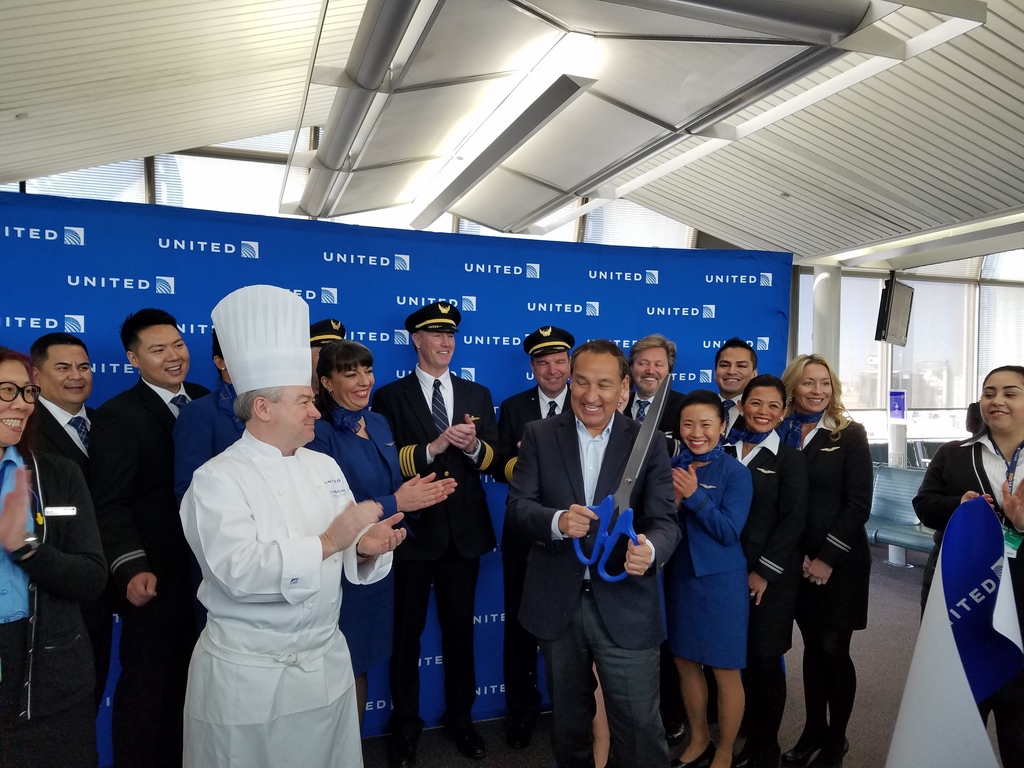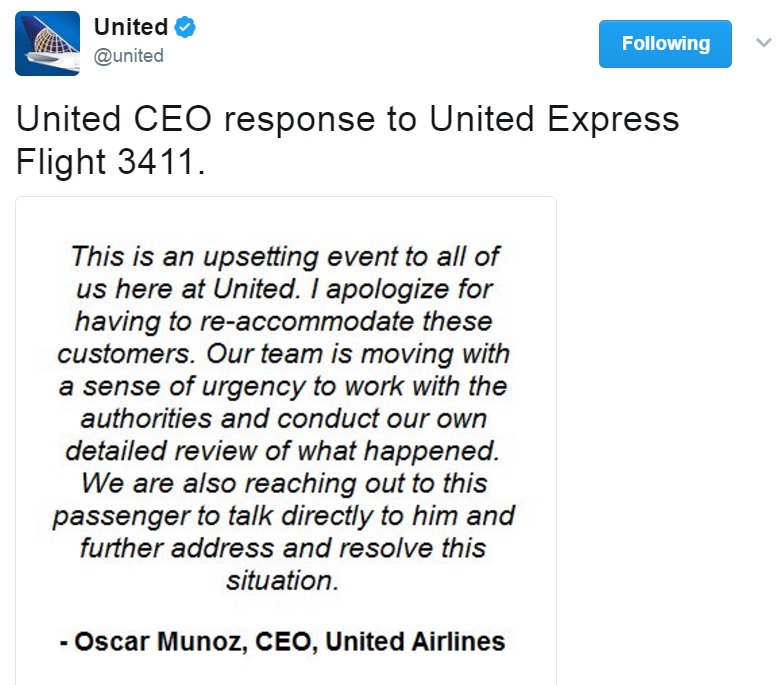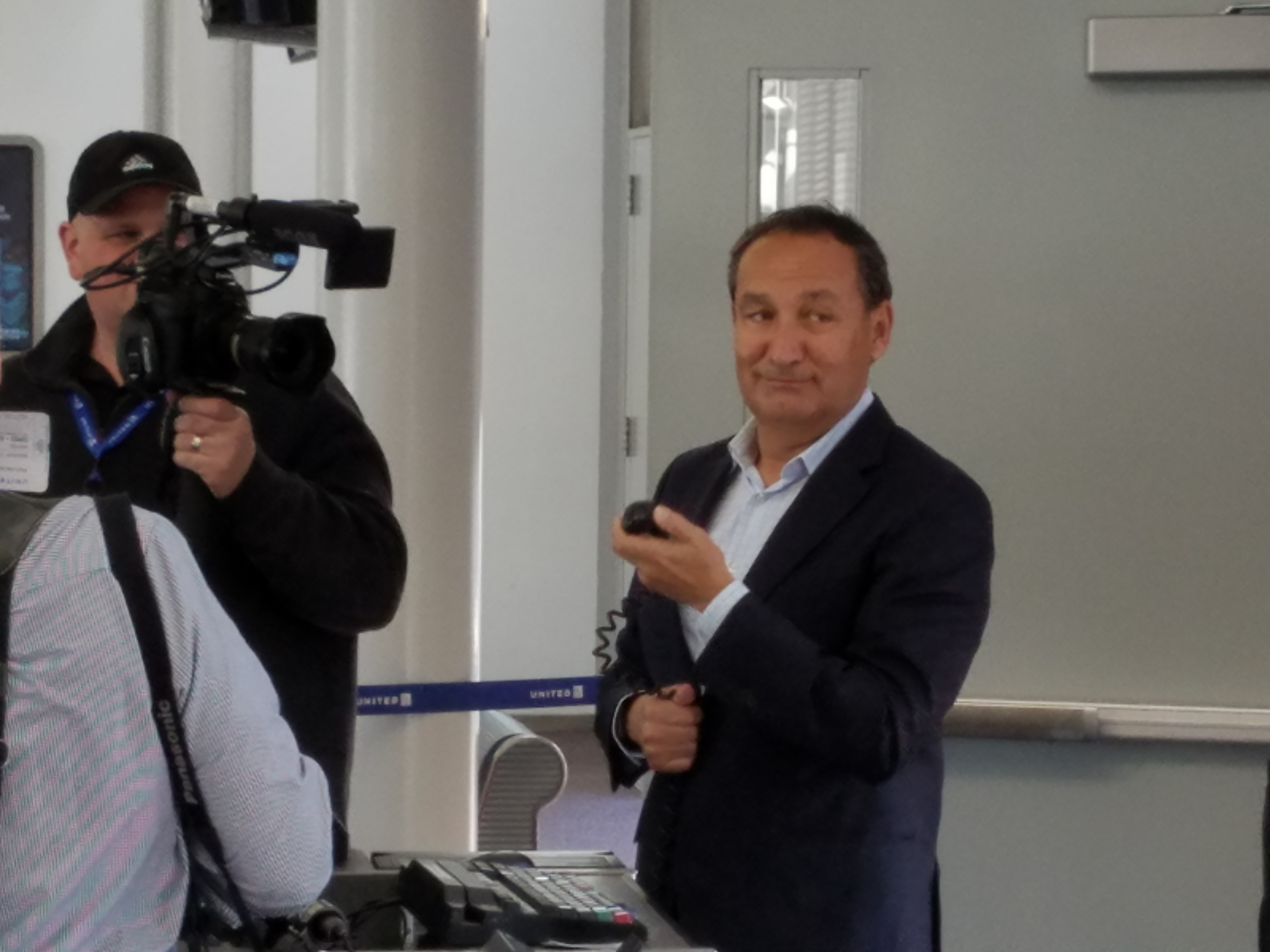Former United Airlines CEO Oscar Munoz is out with a new book, Turnaround Time: Uniting an Airline and Its Employees in the Friendly Skies. Live and Let’s Fly says he has “very fond memories of Oscar Munoz” but honestly there is only one thing in his entire legacy that matters in a lasting way: as American Airlines exited Kirby as President – they figured they could only keep two out of Doug Parker, Scott Kirby and Robert Isom so decided Kirby was odd man out – Munoz hired him as United’s President. And since post-heart surgery Munoz, without much experience in the airline industry, was always going to be a short-timer this gave Kirby a path to become Chairman of the airline himself.
To be sure, Munoz was part of an important time for United. The airline had just lost its Chairmand and CEO in September 2015 amidst a federal corruption probe. Smisek, the lawyer, should have known to call the FBI when he was being extorted by the Chairman of the Port Authority of New York New Jersey… not agree to do the crime. The Chairman of the Port Authority got a dedicated scheduled flight to his vacation home and back in exchange for putting items United wanted at Newark on the agency’s schedule for consideration.
Smisek’s involvement only came to light because of the federal corruption investigation into ‘Bridgegate,’ creation of traffic jams in Fort Lee, New Jersey as political payback for failing to support the 2013 re-election of Governor Chris Christie. The probe reached into the Port Authority, and while Smisek was never charged Port Authority Chair David Samson was ultimately convicted for extorting the flight from United.
Then-board member Munoz took over in a rush. He lacked experience in the airline industry. However he began to get employees on his side before quickly having to take time out for health reasons. He was initially great for the airline’s culture and he green lit product investments – from Polaris, to coach snacks like stroopwafels, and improved on-board coffee (the previous brand Fresh Brew was derided by customers as ‘Fresh Poo’).

Oscar Munoz Cutting The Ribbon On The First Plane Equipped With New Business Class Seats
Given his health challenges he was likely a short-timer. He was supposed to become CEO and Chairman but his ascent to the Chairmanship of the airline was delayed by the David Dao incident. He blew the airline’s response by apologizing that customers had to be re-accommodated — as opposed to being shocked, angry, or disappointed that a customer was dragged off and bloodied.

Ultimately though the most consequential decision he made was hiring Scott Kirby as his successor. Kirby’s history is as a destroyer of airline customer experience and as a micromanager, eliminating elite bonus miles and charging for water at US Airways, insisting that American AAdvantage blindly follow the revenue-based programs of Delta and United rather than charting its own path and even getting so far in the weeds as to overrule the AAdvantage team over the name of their new 75,000 mile elite tier.
Since Kirby’s arrival at United we’ve seen a steady degradation of the Polaris business class product, from reducing service levels (dropping a flight attendant and pre-plating meals) to efforts to control alcohol consumption. Employee bonuses were cut. The airline failed to invest in competitive wifi in order to offer anything like Delta or American.
Then at the start of the pandemic – under Kirby and Munoz, still – United was the worst actor among major U.S. airlines, breaking the law by refusing refunds to customers for cancelled flights. The airline also devaluing MileagePlus when nobody was looking, via higher award pricing on partner airlines.

Oscar Munoz at Chicago O’Hare
Munoz has good feelings surrounding him, he’s seen as a good guy (despite stealing sand from a public beach), but his legacy is Scott Kirby. It’s meant expansion for United, building back the mainline route network and investing in planes and finally long after promising it beginning to invest in interiors of old planes. Kirby is also the most interesting airline CEO to listen to because he isn’t mealy mouthed, he says what he thinks more than you’d expect from other similarly-situated executives.
Munoz showed promise for United early on but stumbled. I will read his book, and indulge his narrative that will no doubt be one of ‘airline in trouble but executive listens to employees and turns around a culture.’ But it’s his choice of airline President that is his legacy.


Never change, Gary.
I think history will show that the three-way power struggle at American caused AA to lose (by far) the most talented airline manager of the three. AA is now firmly in the “rudderless” position formerly occupied by United until Oscar’s arrival.
It’s no surprise that AA has hired several former UA managers, including the architect of United’s (first) departure from JFK.
Kirby is not without his warts, but there is evidence of a newfound willingness to invest in product that is generally absent at his predecessor airline while the operation of the previous ‘undisputed champ’ seriously falters. There is an opportunity for United to “win” this next business cycle.
Just a reminder that United under Oscar is the only one of the three big US carriers to renege on lifetime club memberships. Liars.
How far United has fallen can be seen comparing the food on Continental BusinessFirst international to current international Polaris product and its inedible food.
United must figure everyone in Polaris is a corporate contract or fortress hub hostage or just a sucker.
Muñoz understood people and railroads – which aren’t terribly dissimilar from airlines. His health cut short what could have been a much longer run. Airlines have long been in the public eye while railroads have had a much more protective position in that regard – until recently.
AA and UA have long had a very competitive position between themselves – so it is more interesting that DL and WN have tried to steer clear of having senior execs that came from either.
Scott Kirby is spending enormous amounts of money – you can (or should be able to) fix a lot of problems by spending money; granted, UA should have spent some money a long time ago, esp. on fleet renewal – but the jury is still out about whether UA will be able to handle the massive increase in debt and leasing costs that they will have to pay – UA’s order book right now is 3X DL’s and even larger than that compared to AA. AA is taking a pause in its fleet spending and is also not trying to chase international markets that didn’t deliver profits; AA is generating margins closer to DL and UA than has been the case in more than a decade. The notion that AA is without direction or 2nd class is simply an attempt by some to handicap AA.
The biggest challenge that AA, WN and UA both face is settling labor contracts esp. for pilots. and that will add significant costs and might not boost revenues near as much as the increased costs. Given the aggressive domestic growth plan that Scott Kirby envisions, matching or exceeding the generous terms of DL’s pilot contract is necessary to ensure a steady supply of new pilots.
Is there a single example airline that Gary can point to that “invests” in their product and earns not just a revenue premium, but a profit premium that is sufficient to cover the airline’s cost of capital? The most profitable, highest return on capital airlines in North America and Europe, are LCCs or ULCCs. I can’t think of a single airline that has gone upmarket and has done well for shareholders (who, in a publicly-traded company, are the constituents that set the decisions). The only airlines that can go upmarket are the ones that are not beholden to profit motives, but instead serve as flying billboards for their countries’ governments. Passengers always want more and nicer stuff, they rarely want to pay for it…
Cahn’t make this stuff up!
I came in expecting to read that Oscar’s legacy as UA CEO would be the “Dr. Dao Dragging Debacle”, but to find out that his picking of Kirby “The Destroyer” will be his legacy in a negative way is not only absolutely baffling but perhaps the worst example of personal animosity toward an individual clouding judgement. I have butted heads with @Gary on his passionate animosity toward Kirby, but this is way over the top.
Munoz’s legacy will be that he brought UA back from the brink and then left the airline in the capable hands of a knowledgeable and seasoned CEO, Scott Kirby, under whose leadership UA has thrived. To claim otherwise with a straight face is to reveal one’s own deep-seated psychopathology.
To ensure that I was not going on a limb, I stopped briefly to do some “research” about Kirby’s performance as UA CEO, and my first “hit” was from another travel blog, OMAAT. Despite initially harboring a negative view of Kirby like pretty much everyone else did in the travel blogosphere echo chamber, the OMAAT host penned a post titled United Airlines CEO Scott Kirby: I’m Impressed (Google search it to find the full text), is more credible in my view because it required the blogger to reevaluate his own views, which is no easy to do, and the rationale for the change of heart is factually laid out, which is not at all the case for the post here.
Here’s an outline of the OMAAT post, along with the blogger’s bottom line on Kirby’ performance as the top brass at UA:
We provide the contrast, you decide!
“It is not the critic who counts: not the man who points out how the strong man stumbles or where the doer of deeds could have done better. The credit belongs to the man who is actually in the arena, whose face is marred by dust and sweat and blood, who strives valiantly, who errs and comes up short again and again, because there is no effort without error or shortcoming, but who knows the great enthusiasms, the great devotions, who spends himself in a worthy cause; who, at the best, knows, in the end, the triumph of high achievement, and who, at the worst, if he fails, at least he fails while daring greatly, so that his place shall never be with those cold and timid souls who knew neither victory nor defeat.” — Theodore Roosevelt
Well said. It’s very unfortunate that a successor who actually cared about improving the product wasn’t readily available.